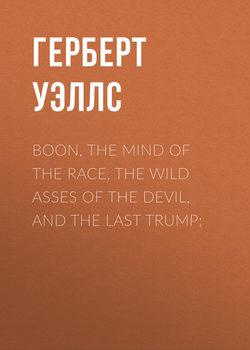Boon, The Mind of the Race, The Wild Asses of the Devil, and The Last Trump;

Реклама. ООО «ЛитРес», ИНН: 7719571260.
Оглавление
Герберт Уэллс. Boon, The Mind of the Race, The Wild Asses of the Devil, and The Last Trump;
CHAPTER THE FIRST. The Back of Miss Bathwick and George Boon
CHAPTER THE SECOND. Being the First Chapter of "The Mind of the Race"
CHAPTER THE THIRD. The Great Slump, the Revival of Letters, and the Garden by the Sea
CHAPTER THE FOURTH. Of Art, of Literature, of Mr. Henry James
CHAPTER THE FIFTH. Of the Assembling and Opening of the World Conference on the Mind of the Race
CHAPTER THE SIXTH. Of not liking Hallery and the Royal Society for the Discouragement of Literature
CHAPTER THE SEVENTH. Wilkins makes Certain Objections
CHAPTER THE EIGHTH. The Beginning of "The Wild Asses of the Devil"
CHAPTER THE NINTH. The Hunting of the Wild Asses of the Devil
CHAPTER THE TENTH. The Story of the Last Trump
Отрывок из книги
It is quite probable that the reader does not know of the death of George Boon, and that “remains” before his name upon the title-page will be greeted with a certain astonishment. In the ordinary course of things, before the explosion of the war, the death of George Boon would have been an event – oh! a three-quarters of a column or more in the Times event, and articles in the monthlies and reminiscences. As it is, he is not so much dead as missing. Something happened at the eleventh hour – I think it was chiefly the Admiralty report of the fight off the Falkland Islands – that blew his obituary notices clean out of the papers. And yet he was one of our most popular writers, and in America I am told he was in the “hundred thousand class.” But now we think only of Lord Kitchener’s hundred thousands.
It is no good pretending about it. The war has ended all that. Boon died with his age. After the war there will be a new sort of book-trade and a crop of new writers and a fresh tone, and everything will be different. This is an obituary, of more than George Boon… I regard the outlook with profound dismay. I try to keep my mind off it by drilling with the Shrewsbury last line of volunteers and training down the excrescences of my physical style. When the war is over will be time enough to consider the prospects of a superannuated man of letters. We National Volunteers are now no mere soldiers on paper; we have fairly washable badges by way of uniform; we have bought ourselves dummy rifles; we have persuaded the War Office to give us a reluctant recognition on the distinct understanding that we have neither officers nor authority. In the event of an invasion, I understand, we are to mobilize and … do quite a number of useful things. But until there is an invasion in actual progress, nothing is to be decided more precisely than what this whiff of printer’s shrapnel, these four full stops, conveys…
.....
But these scraps and fragments are of an irregularity diametrically contrasting with this. They seem to have been begun upon impulse at any time, and abandoned with an equal impulsiveness, and they are written upon stationery of a variety and nature that alone would condemn them in the eyes of an alienist. The handwriting is always atrocious and frequently illegible, the spelling is strange, and sometimes indecently bad, the punctuation is sporadic, and many of the fragments would be at once put out of court as modern literature by the fact that they are written in pencil on both sides of the paper! Such of the beginnings as achieve a qualified completeness are of impossible lengths; the longest is a piece – allowing for gaps – of fourteen thousand words, and another a fragment shaping at about eleven. These are, of course, quite impossible sizes, neither essay nor short story nor novel, and no editor or publisher would venture to annoy the public with writings of so bizarre a dimension. In addition there are fragments of verse. But I look in vain for anything beyond the first chapter of that tremendous serial, “The Wild Asses of the Devil,” that kept on day by day through June and July to the very outbreak of the war, and only a first chapter and a few illustrations and memoranda and fragments for our “Mind of the Race,” that went on intermittently for several years. Whole volumes of that great hotchpotch of criticism are lost in the sandbanks of my treacherous memory for ever.
Of the “Mind of the Race” I may perhaps tell first. I find he had written out and greatly embellished the singularly vivid and detailed and happily quite imaginary account of the murder of that eminent litterateur, Dr. Tomlinson Keyhole, with which the “Mind of the Race” was to have concluded; and there are an extraordinarily offensive interview with Mr. Raymond Blathwayt (which, since it now “dates” so markedly, I have decided to suppress altogether) and an unfinished study of “the Literary Statesmen of the Transition Years from the Nineteenth to the Twentieth Centuries” (including a lengthy comparison of the greatness of Lords Bryce and Morley, a eulogy of Lord Morley and a discussion whether he has wit or humour) that were new to me. And perhaps I may note at this point the twenty sixpenny washing books in which Boon had commenced what I am firmly convinced is a general index of the works of Plato and Aristotle. It is conceivable he did this merely as an aid to his private reading, though the idea of a popular romancer reading anything will come to the general reader with a little shock of surprise.
.....